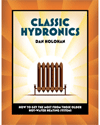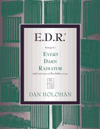Novel thoughts
Pulitzer authors chronicle heating professionals’ importance.
Pulitzer authors chronicle heating professionals’ importance.

While researching people who subscribe to magazines, an advertising company came across an elderly farmer who recently began subscribing to both National Geographic and Playboy. That confused the researchers because this gent clearly didn’t fit well anywhere in their demographic model. So they called him.
“Sir,” the caller said, “we see very little similarity between these two magazines. Would you please tell us why you subscribe to both?”
“Well,” the old fella said. “Both magazines have great stories and dozens of beautiful color photographs of places I’ll never get to visit.”
So there.
Because I am in the semifinals of life, I read a lot of books. I do this because books take me to places I’ll never get to visit, and that includes the past. There’s so much we can learn about this business from the past and I find the best lessons come from stories.
Each year, I set out to read at least 100 good books. This is my hobby and also a big part of my job. Writers have to stand in a pounding surf of words and absorb the stories.
This year, I decided to read all the books that have ever won the Pulitzer Prize for Fiction. There are 85 of them. They begin in 1918. Some years (such as this year) had no winner. I decided to read the list from both ends, aiming for the center, which is 1964, a year in which there was no winner. Each book is wonderful in its own way. Some are page-turners; others are head-scratchers. While fighting my way through one of William Faulkner’s tomes (he won the Pulitzer twice), I came across a sentence that went on for five-and-a-half pages. I went immediately from that sentence to the liquor cabinet.
But I digress.
The newer novels are mainly about angst (and sex, of course), and if they mention heating at all, they get it wrong. We come across, for instance, whirring pumps that circulate steam though the pipes. This usually gets me talking aloud to the pages. Are there no technical editors at these publishing companies? Couldn’t this brilliant novelist have called his local heating contractor and hired him for an afternoon to answer some basic questions?
But stuff like that seems to be important only to those of us in this business. Most modern readers don’t sweat the technical details of heating but what it takes to stay warm. Only the writers of the earlier novels cared about that. And there’s a lesson there.
Joseph Pulitzer wanted the prize for fiction to go to books that dealt with American life, which is what makes them so delicious for me. Each novel or book of short stories freezes American life at a point in time. We find people living in cities, trying to get the fires going in boilers. We learn about coal and all that it involved. We also learn about what it takes to make a good fire in the fireplaces, and who had to do that each day. We come across troubled and starving families living in prairie homes, and sleeping together to keep warm. This idea of warmth, which we take for granted, was as essential to them as smartphones are to us. We joke that we can’t live without our smartphones, but those Americans were serious when they said they couldn’t live without the fire.
So I begin with the 1918 Pulitzer Prize for Fiction winner (“His Family” by Ernest Poole), and also with the 2011 winner (“A Visit from the Goon Squad” by Jennifer Eagan). Then I take the next two, one from each end; read these and then pick up the next two. And so on. I immerse myself in these people’s lives month after month. Taken together, it’s like watching a time-lapse film of America, played from both ends. I began on New Year’s Day and yesterday was Memorial Day. I’ve read 74 of the 85 books so far, and I’ve learned that we, as an industry, have done a very good job. Most Americans are comfortable now and they take what we do for granted. If the writers mention us at all these days the comment often involves a butt crack. There’s very little respect.
Read any of these older novels, though, and you’ll marvel at the way the writer treats our profession. Central heating and ventilation were new. Read these books and you’ll quake at what happens when neither is right. You’ll begin to see winter as they did so many years ago. For them, winter was a perennial brute, something for which you must carefully prepare. If not, it will steal your children. The cold is a living character in these older books but not so anymore because we have done our jobs well.
They think of us only when things break and then it is with resentment. We don’t come quickly enough because this is a Twitter world now. We charge too much because, after all, when we are through making repairs, they will only have what they had before we showed up and nothing more. And when you take something such as warmth for granted, you assign it little value. We perceive warmth as a right these days. It has lost its urgency.
And all because we do what we do so well. Our professional competency has devalued us. And this is why there is a crying need for stories right now.
Warmth is not a right. It must be worked for and earned. What would American life be like without us? Suppose we stopped doing what we do so invisibly from day to day? Read those earlier novels and the later ones. Read your way toward the 1964 center. Read and think, or don’t read and just take my word for it. The important thing is to tell our story to people. Begin like this: Once upon a time, winter was inside as well as outside. We came along and changed that. And in doing so, we changed American lives for the better. What we do is important. And we are essential.
How’s that for a novel thought?

While researching people who subscribe to magazines, an advertising company came across an elderly farmer who recently began subscribing to both National Geographic and Playboy. That confused the researchers because this gent clearly didn’t fit well anywhere in their demographic model. So they called him.
“Sir,” the caller said, “we see very little similarity between these two magazines. Would you please tell us why you subscribe to both?”
“Well,” the old fella said. “Both magazines have great stories and dozens of beautiful color photographs of places I’ll never get to visit.”
So there.
Because I am in the semifinals of life, I read a lot of books. I do this because books take me to places I’ll never get to visit, and that includes the past. There’s so much we can learn about this business from the past and I find the best lessons come from stories.
Each year, I set out to read at least 100 good books. This is my hobby and also a big part of my job. Writers have to stand in a pounding surf of words and absorb the stories.
This year, I decided to read all the books that have ever won the Pulitzer Prize for Fiction. There are 85 of them. They begin in 1918. Some years (such as this year) had no winner. I decided to read the list from both ends, aiming for the center, which is 1964, a year in which there was no winner. Each book is wonderful in its own way. Some are page-turners; others are head-scratchers. While fighting my way through one of William Faulkner’s tomes (he won the Pulitzer twice), I came across a sentence that went on for five-and-a-half pages. I went immediately from that sentence to the liquor cabinet.
But I digress.
Heating is a character
What I really want to tell you about today is the way that heating appears in just about all of the old novels, and almost as a character. The stove, the fireplace, the boiler, the radiators - they all move with the plot and affect the lives of the people in the stories. The novels keep circling back to the mechanical, to how it worked or didn’t, and the crying need for warmth.The newer novels are mainly about angst (and sex, of course), and if they mention heating at all, they get it wrong. We come across, for instance, whirring pumps that circulate steam though the pipes. This usually gets me talking aloud to the pages. Are there no technical editors at these publishing companies? Couldn’t this brilliant novelist have called his local heating contractor and hired him for an afternoon to answer some basic questions?
But stuff like that seems to be important only to those of us in this business. Most modern readers don’t sweat the technical details of heating but what it takes to stay warm. Only the writers of the earlier novels cared about that. And there’s a lesson there.
Joseph Pulitzer wanted the prize for fiction to go to books that dealt with American life, which is what makes them so delicious for me. Each novel or book of short stories freezes American life at a point in time. We find people living in cities, trying to get the fires going in boilers. We learn about coal and all that it involved. We also learn about what it takes to make a good fire in the fireplaces, and who had to do that each day. We come across troubled and starving families living in prairie homes, and sleeping together to keep warm. This idea of warmth, which we take for granted, was as essential to them as smartphones are to us. We joke that we can’t live without our smartphones, but those Americans were serious when they said they couldn’t live without the fire.
So I begin with the 1918 Pulitzer Prize for Fiction winner (“His Family” by Ernest Poole), and also with the 2011 winner (“A Visit from the Goon Squad” by Jennifer Eagan). Then I take the next two, one from each end; read these and then pick up the next two. And so on. I immerse myself in these people’s lives month after month. Taken together, it’s like watching a time-lapse film of America, played from both ends. I began on New Year’s Day and yesterday was Memorial Day. I’ve read 74 of the 85 books so far, and I’ve learned that we, as an industry, have done a very good job. Most Americans are comfortable now and they take what we do for granted. If the writers mention us at all these days the comment often involves a butt crack. There’s very little respect.
Read any of these older novels, though, and you’ll marvel at the way the writer treats our profession. Central heating and ventilation were new. Read these books and you’ll quake at what happens when neither is right. You’ll begin to see winter as they did so many years ago. For them, winter was a perennial brute, something for which you must carefully prepare. If not, it will steal your children. The cold is a living character in these older books but not so anymore because we have done our jobs well.
Times have changed
In 1918, the person who could bring steam - or hot-water heat to your home was nearly a magician. This was a person who could change lives for the better - who could save lives. But generations slid by as the Pulitzer committee awarded the prizes. The people in the HVAC business learned from each other. The equipment got better and then it became automatic. We got so good as a profession that we disappeared. People take us for granted now. Winter is artificial now. It’s something that’s outside and easily avoided. Thermostats watch us move around rooms and learn our habits. They tell efficient boilers and furnaces when to start and stop and this happens without Americans thinking about any of it.They think of us only when things break and then it is with resentment. We don’t come quickly enough because this is a Twitter world now. We charge too much because, after all, when we are through making repairs, they will only have what they had before we showed up and nothing more. And when you take something such as warmth for granted, you assign it little value. We perceive warmth as a right these days. It has lost its urgency.
And all because we do what we do so well. Our professional competency has devalued us. And this is why there is a crying need for stories right now.
Warmth is not a right. It must be worked for and earned. What would American life be like without us? Suppose we stopped doing what we do so invisibly from day to day? Read those earlier novels and the later ones. Read your way toward the 1964 center. Read and think, or don’t read and just take my word for it. The important thing is to tell our story to people. Begin like this: Once upon a time, winter was inside as well as outside. We came along and changed that. And in doing so, we changed American lives for the better. What we do is important. And we are essential.
How’s that for a novel thought?
Links
Looking for a reprint of this article?
From high-res PDFs to custom plaques, order your copy today!






